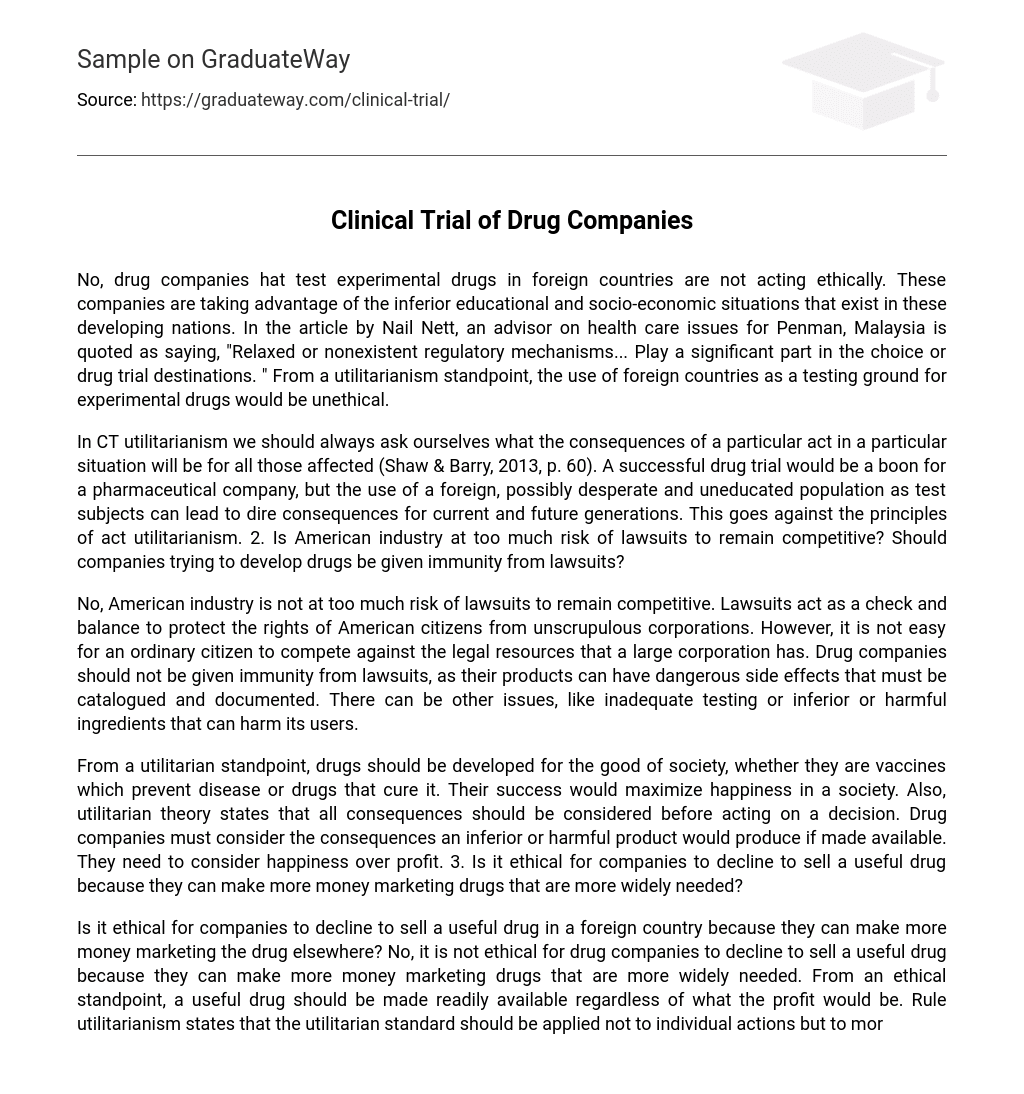No, drug companies hat test experimental drugs in foreign countries are not acting ethically. These companies are taking advantage of the inferior educational and socio-economic situations that exist in these developing nations. In the article by Nail Nett, an advisor on health care issues for Penman, Malaysia is quoted as saying, “Relaxed or nonexistent regulatory mechanisms… Play a significant part in the choice or drug trial destinations. ” From a utilitarianism standpoint, the use of foreign countries as a testing ground for experimental drugs would be unethical.
In CT utilitarianism we should always ask ourselves what the consequences of a particular act in a particular situation will be for all those affected (Shaw & Barry, 2013, p. 60). A successful drug trial would be a boon for a pharmaceutical company, but the use of a foreign, possibly desperate and uneducated population as test subjects can lead to dire consequences for current and future generations. This goes against the principles of act utilitarianism. 2. Is American industry at too much risk of lawsuits to remain competitive? Should companies trying to develop drugs be given immunity from lawsuits?
No, American industry is not at too much risk of lawsuits to remain competitive. Lawsuits act as a check and balance to protect the rights of American citizens from unscrupulous corporations. However, it is not easy for an ordinary citizen to compete against the legal resources that a large corporation has. Drug companies should not be given immunity from lawsuits, as their products can have dangerous side effects that must be catalogued and documented. There can be other issues, like inadequate testing or inferior or harmful ingredients that can harm its users.
From a utilitarian standpoint, drugs should be developed for the good of society, whether they are vaccines which prevent disease or drugs that cure it. Their success would maximize happiness in a society. Also, utilitarian theory states that all consequences should be considered before acting on a decision. Drug companies must consider the consequences an inferior or harmful product would produce if made available. They need to consider happiness over profit. 3. Is it ethical for companies to decline to sell a useful drug because they can make more money marketing drugs that are more widely needed?
Is it ethical for companies to decline to sell a useful drug in a foreign country because they can make more money marketing the drug elsewhere? No, it is not ethical for drug companies to decline to sell a useful drug because they can make more money marketing drugs that are more widely needed. From an ethical standpoint, a useful drug should be made readily available regardless of what the profit would be. Rule utilitarianism states that the utilitarian standard should be applied not to individual actions but to moral codes as a whole and asks what moral code society should adopt to maximize happiness (Shaw & Barry, 2013, p. 7). In this case, the moral code would have companies make useful drugs available to all everyone regardless of cost. Profit margins should not determine a useful drugs availability. It is not ethical for companies to withhold drugs from foreign countries to make more money elsewhere. Richard Brandt explains, “An optimal code is one designed to maximize welfare or what is good (thus, utility). This leaves open the possibility that a particular right act by itself may not maximize infinite… Thus, drug companies must provide their wares not to everyone, not only the people who can afford it. This action maximizes the welfare of the society. 4. Do companies have an ethical obligation to make drugs available in poor countries at little or no cost? Whether or not a company has an ethical obligation to make drugs available in poor countries at little or no cost depends on the moral code of the company and on which theory it chooses to subscribe to. If they decide to subscribe to the tenets of rule utilitarianism, then they would e bound to maximize happiness of that society.
Making drugs available at a nominal cost will produce this. In many cases, these poor countries were used as the testing grounds for human clinical trials. They may have provided some financial assistance by paying those who participated, but if the drugs are shown to be useful they should be made completely available for all.





